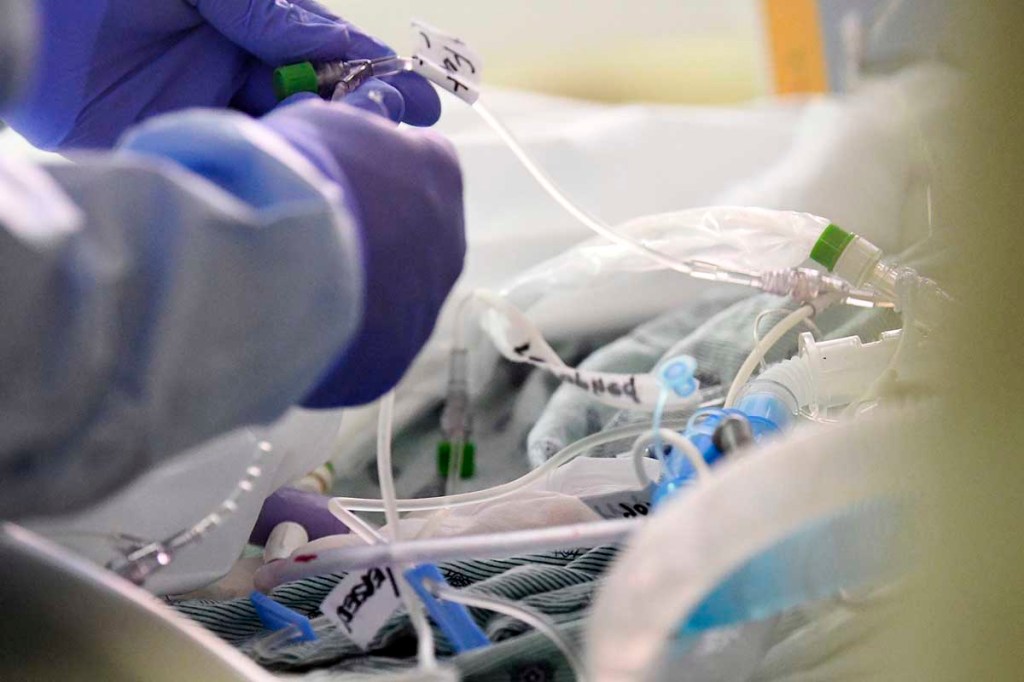Local covid cases continue to climb
Published 5:15 am Saturday, December 26, 2020

- East Alabama Medical Center nurse Harvard Graham checks fluids for a COVID-19 patient in the intensive care unit Thursday, Dec. 10, 2020, in Opelika, Ala. The medical center faces a new influx of COVID-19 patients as the pandemic intensifies.
Heading into the holidays, when health officials are concerned that family gatherings will lead to more COVID-19 cases, Cullman County continues to see an increase in COVID-19 cases and hospitalizations.
In a two-day period this week, Cullman County added more than 300 new cases of COVID-19. At Cullman Regional Medical Center, the intensive care unit has been expanded to accommodate the influx of patients. The hospital is treating 75 COVID-19 patients, 18 of whom are on ventilators.
According to CRMC Chief Medical Officer Dr. William Smith, the hospital isn’t at the point where patients are being sent to other facilities.
“We still have many options to adapt locally to accommodate these patients before sending patients elsewhere. The most concerning thing right now is virtually every hospital in our area is experiencing the same surge in patients, so other facilities ability to accept patients is also limited. Every hospital is doing all they can to keep and take care of their own,” he said.
The surge has also impacted staffing at the hospital. CRMC is using contract nurses to help handle the patient load and has also shifted some nurses from their usual departments to COVID-19 patient care.
“While the staff is holding up well since they are seasoned professionals, don’t underestimate the emotional toll it takes on the staff to deal with these patients. After all many of our staff know these patients personally, go to church with them or are maybe longtime friends; it a stress that can be hard to comprehend,” said Smith. “It takes more nurses per patient for critical care patients so when we are at 160% ICU capacity we are using a lot more nurses for a few patients. This stretches the staff in other areas.”
At the beginning of the pandemic, all non-emergency surgeries at Alabama hospitals were suspended. While that directive from the state has since expired, CRMC has over the past several weeks temporarily suspended non-emergency surgeries.
“We have had to do that off and on over the past few weeks on a limited basis,” said Smith. “Thankfully so far we are adapting. This is why it is so important for the community to do the very best they can to limit the spread of the virus. As difficult as it is this time of year, limiting the size of gatherings and being especially careful about congregating with people you do not live in the same household with is vitally important. Also, wear a mask at all times around others and socially distance.”
There is concern among health care workers that family and group gatherings at Christmas will continue the surge in cases.
State Health Officer Dr. Scott Harris said, “While we are pleased vaccine products have been authorized for emergency use, not nearly enough vaccine will be available initially, and it will be months before the public at large can be vaccinated. It is important that everyone continue practicing the measures that are effective in preventing transmission of COVID-19 including social distancing, mask wearing, hand hygiene, avoiding people who are sick, avoiding crowded, poorly ventilated indoor spaces, and monitoring their own health.”
Smith said the influx of COVID-19 patients at CRMC has not impacted the care patients coming in for other reasons receive, but the large number of COVID-19 patients does add stress to the system.
“It does make it much more challenging given the demand on the staff created by all the COVID patients,” he said. “Flu has not been as bad, quite possibly because of people wearing masks and distancing. But it is important to note, COVID is much more infectious than the flu and demands even more vigilance with masks, distancing and isolation.”
COVID patients also typically require longer hospitalizations than other patients. According to CRMC, the average length of a hospital stay for a non-COVID-19 patient is three to four days. COVID-19 patients, however, can be in the hospital from seven to 10 days, and even longer if on a ventilator.





